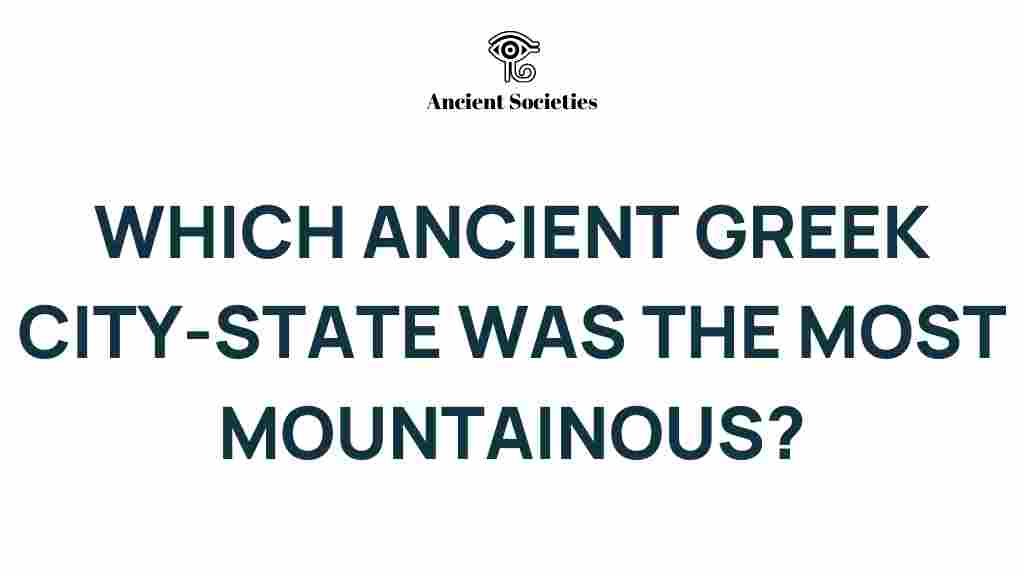Unveiling the Most Mountainous Ancient Greek City-State
Ancient Greece, a civilization renowned for its profound influence on Western culture, was characterized by a series of independent city-states, each with its unique geography, history, and culture. Among these city-states, some were nestled in mountainous regions, which not only shaped their development but also influenced their social and political structures. In this article, we will explore the most mountainous ancient Greek city-state, focusing on how its topography affected its society, economy, and culture.
The Geography of Ancient Greece
The geography of Ancient Greece is marked by rugged mountains, deep valleys, and a fragmented coastline. This topography played a pivotal role in the formation of city-states. Each city-state developed in isolation due to the natural barriers, which led to distinct cultures and political systems.
- **Mountains:** The Pindus mountain range runs through the center of Greece, creating a series of high peaks and deep gorges.
- **Valleys and Plains:** Fertile plains, such as Thessaly, provided agricultural opportunities, while valleys allowed for trade routes.
- **Coastline:** The extensive coastline and numerous islands facilitated maritime trade and cultural exchange.
Exploring the Most Mountainous City-State: Arcadia
Among the various city-states of Ancient Greece, Arcadia stands out as the most mountainous. Located in the central Peloponnese, Arcadia is characterized by its rugged terrain, dense forests, and high altitudes.
Arcadia’s Topography
Arcadia’s geography consists of steep mountains and hills, with elevations that often exceed 1,000 meters. The region is known for its natural beauty, featuring lush landscapes and abundant wildlife. The most significant mountains in Arcadia include:
- **Mount Lykaion:** A sacred mountain linked to Zeus, which was also the site of ancient athletic games.
- **Mount Mainalon:** Known for its rich biodiversity and hiking trails.
- **Mount Kyllini:** Famed for its historical significance and archaeological sites.
The History of Arcadia
Arcadia has a rich history that dates back to ancient times. It was often considered a pastoral paradise, symbolizing simplicity and harmony with nature. The ancient Greeks viewed Arcadia as a place of peace, untouched by the chaos of city life.
Key Historical Events
Throughout history, Arcadia was involved in various significant events:
- **The Arcadian League (5th century BC):** A confederation of city-states that aimed to promote unity and mutual defense.
- **Peloponnesian War:** Arcadia played a role in the conflict between Athens and Sparta, often siding with Sparta.
- **Roman Conquest:** The region eventually fell under Roman control, but its cultural legacy persisted.
The Culture of Arcadia
Arcadia’s culture was deeply intertwined with its geography. The mountainous terrain fostered a unique way of life, particularly in terms of agriculture, religion, and the arts.
Religion and Mythology
The people of Arcadia worshiped many gods, with a particular reverence for Pan, the god of the wild. The region’s mountains were considered sacred, and many myths and legends were born from the natural landscapes. Notably:
- **Pan’s Connections:** Pan was believed to roam the Arcadian mountains, embodying the spirit of the wilderness.
- **Festivals:** The region hosted numerous festivals celebrating agricultural cycles and honoring the gods.
Arts and Literature
Arcadia has also inspired numerous poets and philosophers. The idyllic scenery and the pastoral lifestyle contributed to a rich tradition of literature:
- **Theocritus:** A poet who wrote about the rustic life in Arcadia, emphasizing the beauty of the natural world.
- **Virgil:** The Roman poet was heavily influenced by Arcadian themes in his work.
Exploration and Archaeology in Arcadia
Archaeological exploration in Arcadia has unveiled numerous artifacts and sites that provide insight into its ancient civilization. Key archaeological sites include:
- **Ancient Tegea:** Known for its temples and theaters, which showcase the architectural prowess of the time.
- **The Sanctuary of Artemis:** A significant religious site that highlights the importance of worship in Arcadian life.
- **Lykaion Sanctuary:** An archaeological site where the ancient Olympic games were held in honor of Zeus.
Archaeological efforts continue to reveal more about the lives of the ancient Arcadians, shedding light on their social structures, economic practices, and cultural traditions.
Troubleshooting Common Misconceptions
When studying the mountainous city-states of Ancient Greece, several misconceptions often arise. Here are some common issues and clarifications:
- **Misconception:** All city-states were similar in culture and governance.
**Clarification:** Each city-state, including Arcadia, developed its unique identity shaped by its geography. - **Misconception:** Arcadia was solely a pastoral region.
**Clarification:** While it is known for its rural beauty, Arcadia also had thriving urban centers with complex societies. - **Misconception:** The mountainous landscape hindered development.
**Clarification:** The mountains provided natural resources and defense, fostering unique economic activities.
Conclusion
In conclusion, the study of Arcadia as the most mountainous ancient Greek city-state reveals the intricate relationship between geography and culture. The rugged terrain not only influenced the daily lives of its inhabitants but also shaped their beliefs, practices, and artistic expressions. As we continue to explore the archaeological remains and historical texts, we gain a deeper appreciation for how the mountainous regions of Ancient Greece played a crucial role in the development of its city-states.
For those interested in further exploring the fascinating world of Ancient Greece, consider visiting archaeological sites or engaging with scholarly resources. You can find more information about Ancient Greek archaeology here.
Arcadia’s legacy continues to inspire modern exploration, reminding us of the rich tapestry woven by geography, history, and culture. Whether through hiking its trails or studying its ancient texts, the mountainous regions of Ancient Greece offer endless opportunities for discovery.
This article is in the category History and created by AncientSocieties Team
